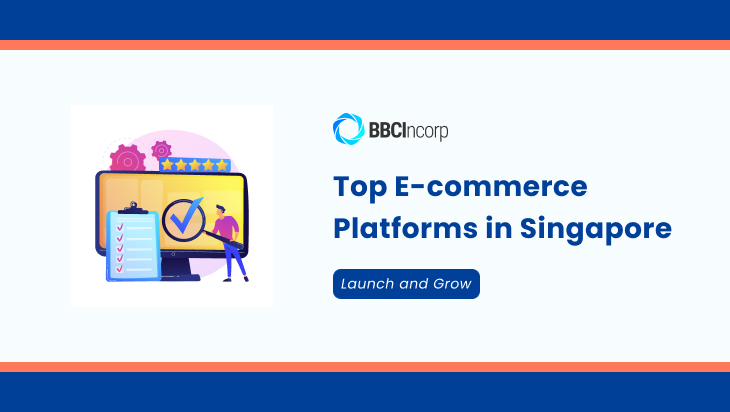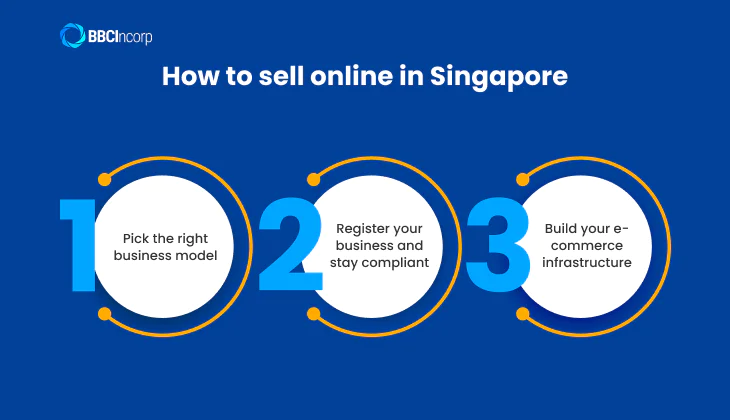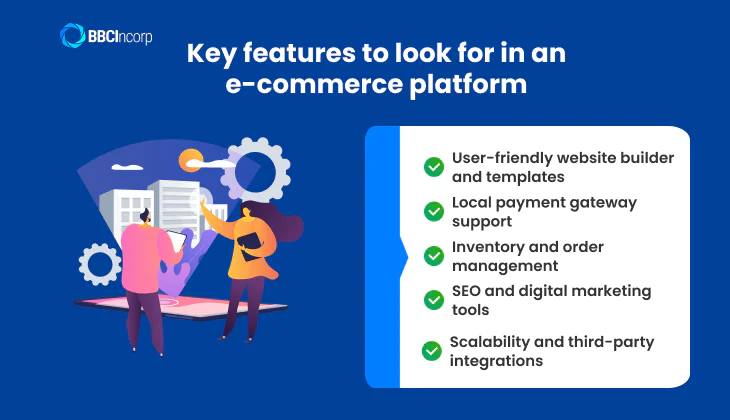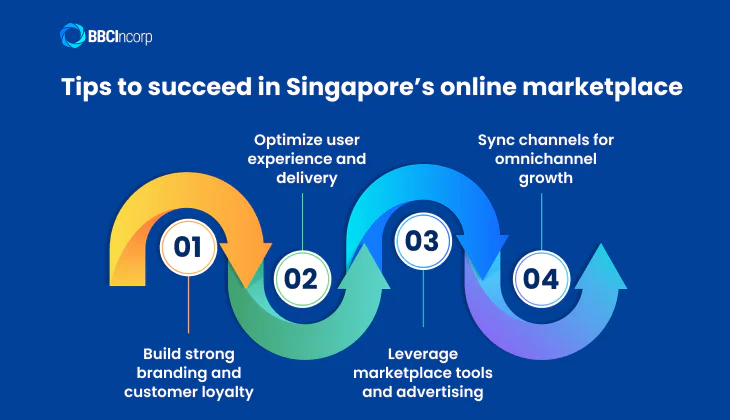
- Understanding E-commerce in Singapore
- How to sell online in Singapore
- Best e-commerce platforms in Singapore
- Shopify: Ideal for branded growth
- WooCommerce: Flexible for WordPress users
- Lazada: Trusted regional hub
- Shopee: Built for mobile-first selling
- Carousell: Casual and community-driven
- Wix: Simple and visual
- Square Online: Best for offline-to-online integration
- BigCommerce: Designed for scaling up
- Ecwid: Add e-commerce to any website
- Shift4Shop: Advanced features, greater control
- OpenCart: Open-source and modular
- Big Cartel: Perfect for creators
- Key features to look for in an e-commerce platform
- Challenges of selling on e-commerce platforms
- Tips to succeed in Singapore’s online marketplace
- How BBCIncorp supports e-commerce businesses
An e-commerce platform is a digital solution that allows businesses to create, operate, and grow an online store with ease. Selecting the right e-commerce platform in Singapore is crucial, as it directly impacts customer experience, operational efficiency, and long-term growth in a fast-evolving market. Singapore stands out as a hub in Southeast Asia’s digital economy, with strong infrastructure and a vibrant online marketplace.
In this article, BBCIncorp guides you through the top e-commerce platforms Singapore businesses rely on, compares their key features, and shares actionable tips for setting up and scaling online store platforms successfully.
Understanding E-commerce in Singapore
Singapore is one of Southeast Asia’s most advanced e-commerce markets, offering an ideal environment for businesses to launch and scale online. In 2024, the e-commerce market reached around USD 5 billion in revenue. By 2026, GMV is projected to surpass USD 10 billion as more businesses and consumers embrace digital commerce(1).
High internet penetration and a mobile-first culture drive this growth. As of early 2025, over 95% of Singapore’s population is online. 5G connections are expected to increase to 55% per Statista(2).
Shoppers increasingly expect seamless, fast, and personalized experiences across every online e-commerce marketplace and branded store they visit. Adoption of digital wallets, on-demand delivery, and cross-border purchases reflects the sophistication of local consumer behavior.
Government initiatives and infrastructure further strengthen Singapore’s position as a regional hub. Programs like SMEs Go Digital provide grants and advisory support for small and medium-sized enterprises to adopt the right e-commerce platforms that Singapore businesses need.
The country’s world-class logistics, reliable payment systems, and strong regulatory framework make it easy for companies to operate both locally and regionally.
Together, these factors establish Singapore as a leading player in Southeast Asia’s digital economy. Its strategic location and business-friendly environment attract entrepreneurs looking to build scalable online stores and tap into a growing Singapore online marketplace ecosystem.
Businesses need to understand these dynamics to pick the best e-commerce platforms and align their strategies with market expectations.
How to sell online in Singapore

Selling online in Singapore presents exciting opportunities, but success depends on making informed strategic and operational decisions from the outset. Each step, from business model to infrastructure, plays a vital role in shaping your growth.
Pick the right business model
The first step is to determine a structure that aligns with your objectives. Many businesses start with marketplaces like Lazada or Shopee for their ready-made customer base, though these limit how much you can showcase your brand. A branded website offers full creative and operational control, which is better suited for building a long-term identity.
You should also determine how you will fulfill orders: managing your inventory provides reliability, while dropshipping and print-on-demand offer flexibility with lower upfront investment.
Register your business and stay compliant
Before selling, make sure your venture meets Singapore’s regulatory requirements. Incorporating a company is simple with the help of service providers such as BBCIncorp, who can handle paperwork and guide you through the process.
You will also need to open a corporate bank account and check if any sector-specific permits are necessary. If your projected turnover exceeds SG$1 million, registering for Goods and Services Tax (GST) is required.
Build your e-commerce infrastructure
Finally, set up the systems that power your online store. Select an online shop platform that integrates with secure payment gateways like Stripe, PayPal, or local option HitPay, providing customers with reliable ways to pay.
Establish a logistics plan by working with dependable delivery partners and defining clear shipping policies. To enhance performance, use tools for customer service, analytics, and relationship management, which help you respond quickly and make data-driven decisions.
By choosing the right approach, formalizing your setup, and equipping your operations with the right technology, you create a strong foundation to thrive in Singapore’s digital marketplace.
Best e-commerce platforms in Singapore
Finding the right solution to launch your online business in Singapore depends on your goals, the type of products you offer, and how far you plan to grow.
Whether you prefer a custom-built store or want to tap into an established customer base, various tools cater to different business models and experience levels. Below is a breakdown of popular options used by sellers across the region.
| Platform | Best For | Pricing (SG$/month) | Transaction Fees (2025) |
| Shopify | Branded growth and scalability | Online from: Basic Plan: SG$29 Grow Plan: SG$99 Advanced Plan: SG$399 | Online:
No extra Shopify fee when using Shopify Payments Third-party adds 2%, 1% or 0.5% respectively
|
| WooCommerce | Flexible WordPress customization | Free plugin (hosting extra) | Payment gateway fees ~2.9% + fixed fees (varies) |
| Lazada | Regional marketplace beginners | Free to list | 8–16% commission by category, plus 8% SST on delivered orders |
| Shopee | Mobile-first local selling | Free to list | Local sellers: commission ~5–7% + transaction fee 2% Cross‑border: up to 14%
|
| Carousell | Casual and community-driven | Free basic use Professional sellers: If revenue exceeds SG$1,300/mo, a 2.5% service fee applies to chat-based transactions, capped at SG$30/sale | No standard commission; premium listing optional |
| Wix | Beginners with simple needs | From around SG$30 (Business Basic) | Payment processing ~2.9% + fixed fee |
| Square Online | Offline to online integration | Free basic plan, paid from SG$20 | Online: ~2.9% + SG$0.30 In-person: ~2.6% + SG$0.15 |
| BigCommerce | High growth with large catalogs | Standard: ~SG$52 Plus: ~SG$140 Pro: ~SG$530 | ~2.2–2.9% + SG$0.30 (via gateway) |
| Ecwid | Adding a store to the existing site | Free basic Paid from SG$25-$105 | No platform commission, only your chosen payment gateway’s rate (typically 1.9–2.9% + fixed fee) |
| Shift4Shop | Advanced features and control | Free plan available if you process at least US$1,000/mo through Shift4 Payments Paid plans start around ~SG$52 | ~2.9% + SG$0.30 with Shift4Payments |
| OpenCart | Developer-driven customization | Free software (hosting extra) | Gateway fees ~2.9% + fixed fee |
| Big Cartel | Artists and indie makers | Free up to 5 products Platinum at SG$20/mo and Diamond at SG$40/mo | ~2.9% + fixed fee via gateway |
Shopify: Ideal for branded growth
Shopify is a fully hosted system designed for entrepreneurs who want to build a polished, professional storefront. It’s known for scalability, ease of use, and access to a vast library of plugins. Singapore-based users benefit from integrations with local logistics and payment services, making it a strong choice for businesses aiming to expand quickly.
WooCommerce: Flexible for WordPress users
WooCommerce is a self-hosted add-on for WordPress sites, offering freedom to customize every part of the selling experience. It suits business owners comfortable with managing technical aspects, as it requires hands-on setup and maintenance. With the right support, it becomes a powerful engine for sellers who value adaptability.
Lazada: Trusted regional hub
Lazada stands out as a widely used marketplace across Southeast Asia. With a focus on lifestyle products and high consumer traffic, it gives local merchants a way to reach customers with minimal upfront investment. It’s particularly useful for those entering the digital space for the first time.
Shopee: Built for mobile-first selling
Shopee is one of Singapore’s most downloaded shopping apps, offering strong user engagement and convenient seller tools. It allows local merchants to create listings, promote offers, and communicate with buyers directly within the platform, all optimized for mobile behavior.
Carousell: Casual and community-driven
Carousell works well for informal or hyperlocal sales. With a user-friendly interface and peer-to-peer format, it appeals to individuals and small shops focusing on used goods or niche categories. Its simplicity and personal feel resonate with mobile-savvy users.
Wix: Simple and visual
Wix provides a drag-and-drop builder that’s perfect for beginners. Entrepreneurs who want to launch quickly without coding knowledge can create a storefront with ease. It works well for service-based ventures or sellers offering limited product lines.
Square Online: Best for offline-to-online integration
Designed for sellers already using Square’s point-of-sale tools, this option connects physical and web-based sales in one system. It’s a go-to solution for cafés, retail outlets, and event sellers looking to manage stock and payments in sync.
BigCommerce: Designed for scaling up
BigCommerce is a hosted platform for enterprises with large inventories or cross-border goals. With built-in tools for SEO, sales channel integration, and performance tracking, it supports merchants aiming for broader market reach and operational efficiency.
Ecwid: Add e-commerce to any website
Ecwid is a lightweight plugin that allows businesses to place a storefront on their existing site. It’s an excellent solution for those who want to sell without rebuilding their web presence from scratch.
Shift4Shop: Advanced features, greater control
Shift4Shop caters to companies that want full functionality out of the box. It includes CRM tools, B2B support, and inventory features, making it suitable for experienced sellers ready to customize deeply.
OpenCart: Open-source and modular
OpenCart is a developer-friendly framework offering complete control over setup and features. It’s best for businesses with access to technical talent and a desire to craft a unique shopping experience.
Big Cartel: Perfect for creators
Big Cartel was built with artists and independent makers in mind. It offers a clean, minimalist builder and a free plan, making it ideal for creatives who sell small-batch or handmade goods.
There are distinct advantages to each of these options. Depending on your audience, product strategy, and operational capacity, you can decide which online marketplace or online store platform will help you achieve your goals in Singapore’s thriving digital economy.
Next, we’ll discuss what features to consider when picking an e-commerce platform for Singapore.
Key features to look for in an e-commerce platform

Choosing the right foundation for your digital business means evaluating what each solution can offer beyond just a storefront. The best online store platforms help you create a seamless shopping experience, manage operations efficiently, and support your growth. Below are essential features every business should consider when selecting among e-commerce platforms.
User-friendly website builder and templates
A good e-commerce platform that Singapore businesses can rely on should make store creation straightforward. Look for drag-and-drop design tools that allow you to build pages visually without coding.
Responsive templates that adapt to mobile devices are critical, as the majority of online shopping in Singapore happens on smartphones. A clean interface saves time and ensures your customers enjoy a consistent experience across devices.
Local payment gateway support
An effective online shop platform must integrate with trusted, locally preferred payment options. Singapore shoppers expect to see familiar names like PayNow, Stripe, HitPay, and even Buy Now Pay Later services such as Atome. These integrations help reduce cart abandonment by offering flexible, secure payment choices that fit customer preferences.
Inventory and order management
Reliable e-commerce platforms simplify day-to-day operations with features that track inventory in real time, automate order updates, and sync across sales channels. This is especially important for businesses selling on multiple platforms, as it minimizes errors and keeps stock levels accurate. Look for systems that also provide easy return and exchange workflows to enhance customer satisfaction.
SEO and digital marketing tools
To attract and retain customers, your platform should include built-in tools for search engine optimization and digital marketing. Blogs, email campaign builders, Google Shopping feeds, and analytics dashboards all help you reach your audience effectively. The ability to analyze customer behavior and campaign performance empowers you to make smarter decisions.
Scalability and third-party integrations
As your business grows, your chosen platform should grow with you. Support for app stores, logistics plugins, CRM software, and accounting integrations ensures you can expand your capabilities without switching platforms. The more flexible and extensible the solution, the better it supports your long-term ambitions.
Challenges of selling on e-commerce platforms
While these platforms provide an efficient way to reach customers, they also come with challenges businesses must manage carefully.
One of the most common concerns is commission fees and platform dependence. Many marketplaces charge transaction fees, listing costs, or take a percentage of each sale, which can significantly reduce margins over time. Relying solely on a single platform also limits your flexibility if terms change or competition intensifies.
Logistics and rising customer expectations
are another challenge. Shoppers in Singapore expect fast, reliable delivery, often within one or two days. Meeting these standards consistently requires close coordination with delivery partners, real-time inventory tracking, and clear return policies, which add to the complexity.
Brand control
is often limited when selling through an online marketplace. Your products compete alongside others, and aggressive price competition can lead to lower profits. Differentiating your business and maintaining customer loyalty is harder when buyers can easily switch to competitors offering lower prices.
Finally, payment holds and fraud risks are realities sellers must watch for. Some platforms impose reserve periods on funds to protect against chargebacks, which can disrupt cash flow. Fraudulent transactions and fake buyer accounts also pose financial and reputational risks if not properly managed.
Addressing these challenges calls for a proactive approach. Businesses that diversify sales channels, optimize logistics, and strengthen customer relationships are better positioned to succeed despite these hurdles.
Tips to succeed in Singapore’s online marketplace

Selling effectively in Singapore’s dynamic digital space requires more than simply listing products. Here’s what you should do to stand out and build a sustainable business.
Build strong branding and customer loyalty
In a crowded Singapore online marketplace, businesses with a distinct identity attract more attention. Consistent messaging, professional visuals, and personalized service create a strong impression. Loyalty programs, clear communication, and responsive support help foster repeat customers and long-term relationships.
Optimize user experience and delivery
Your online shop platform should offer a seamless and enjoyable shopping journey. Keep product pages clear, mobile-optimized, and easy to navigate. Fast and reliable delivery, ideally within one or two days, is expected by most shoppers. Keeping buyers informed at each stage of their order strengthens trust.
Leverage marketplace tools and advertising
Most e-commerce platform Singapore providers include built-in promotional tools. Sponsored listings, cross-promotions, and coupon campaigns can improve your visibility and drive more traffic to your store.
Sync channels for omnichannel growth
Meeting customers wherever they prefer to shop is key. Synchronize your inventory and sales across multiple platforms and offline touchpoints to deliver a consistent experience. Tools like EasyStore, Airwallex, and other centralized systems make it easier to manage operations and avoid stock discrepancies.
Why incorporation matters for e-commerce success
Build credibility and trust
Incorporation of a company in Singapore is essential if you want to succeed online marketplace or establish a branded store through a platform Singapore businesses use. Registering as a private limited company signals professionalism and reassures customers, partners, and service providers of your commitment.
Many payment gateways, logistics providers, and B2B partners in Singapore require you to have a registered entity before they will work with you. Customers, both local and international, also view an incorporated business as more reliable and trustworthy.
Simplify compliance and operations
Incorporation also helps you meet Singapore’s legal requirements and manage your operations more efficiently. Businesses must maintain proper records, file taxes regularly, and register for GST Singapore (Good and Services Tax) if they cross the threshold. These administrative tasks can quickly become overwhelming when managed internally.
Notably, e-commerce entrepreneurs tend to work with corporate service firms that assist not only with incorporation but also with ongoing accounting, payroll, and corporate secretary services. And BBCIncorp delivers comprehensive solutions tailored to your business needs.
How BBCIncorp supports e-commerce businesses
At BBCIncorp, we have been providing assistance for Singapore-based founders of E-commerce businesses to launch, manage, and grow their online stores successfully by:
Fast remote incorporation
We help you set up a private limited company in Singapore entirely online, giving your business the professional structure needed to access payment gateways, logistics partners, and marketplaces quickly.
Tailored accounting for e-commerce
Our accounting packages are designed for the unique demands of online sales. We handle GST reporting, payroll, and expense tracking so your books stay accurate and compliant even with high transaction volumes.
Ongoing compliance and growth support
We provide corporate secretarial services to keep your company in good standing and offer strategic guidance to help you scale across diverse platforms and expand into new markets.
With BBCIncorp, you gain a trusted partner to take care of the details behind the scenes so you can focus on growing your ecommerce business. Visit our Singapore ecommerce service site for more information or contact us today to get started.
Conclusion
Singapore continues to stand out as a vibrant hub for digital commerce, offering businesses access to a tech-savvy customer base and world-class infrastructure. Thus, choosing the right e-commerce platforms in Singapore is key to truly unlocking this potential.
Incorporating your business and adopting the right digital tools doesn’t just set a foundation; it ignites long-term growth. With a professional structure and the unwavering support you need, you can focus on expanding confidently, knowing you’re staying compliant and fiercely competitive in the fast-moving online marketplace.
Ready to seize this opportunity? For expert guidance and comprehensive company services that will propel your global venture forward, reach out to us at service@bbcincorp.com. Your success story in digital commerce starts now.
References:
(1) https://www.trade.gov/market-intelligence/singapores-e-commerce-market
(2) https://www.statista.com/statistics/1400943/singapore-5g-mobile-connections-share/
Disclaimer: While BBCIncorp strives to make the information on this website as timely and accurate as possible, the information itself is for reference purposes only. You should not substitute the information provided in this article for competent legal advice. Feel free to contact BBCIncorp’s customer services for advice on your specific cases.
- Understanding E-commerce in Singapore
- How to sell online in Singapore
- Best e-commerce platforms in Singapore
- Shopify: Ideal for branded growth
- WooCommerce: Flexible for WordPress users
- Lazada: Trusted regional hub
- Shopee: Built for mobile-first selling
- Carousell: Casual and community-driven
- Wix: Simple and visual
- Square Online: Best for offline-to-online integration
- BigCommerce: Designed for scaling up
- Ecwid: Add e-commerce to any website
- Shift4Shop: Advanced features, greater control
- OpenCart: Open-source and modular
- Big Cartel: Perfect for creators
- Key features to look for in an e-commerce platform
- Challenges of selling on e-commerce platforms
- Tips to succeed in Singapore’s online marketplace
- How BBCIncorp supports e-commerce businesses
Industry News & Insights
Get helpful tips and info from our newsletter!
Stay in the know and be empowered with our strategic how-tos, resources, and guidelines.





